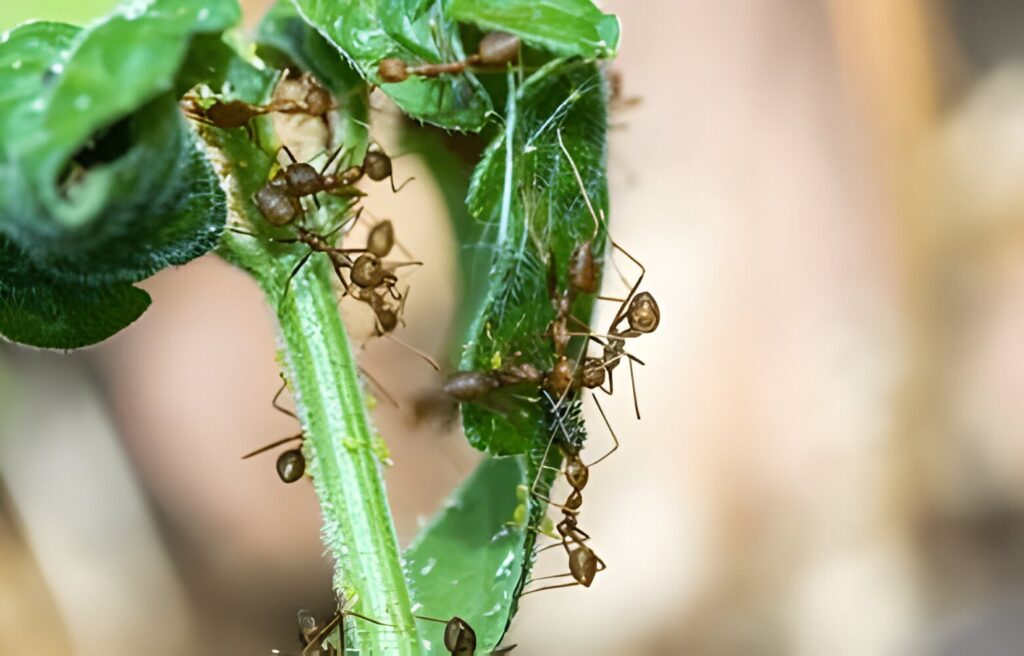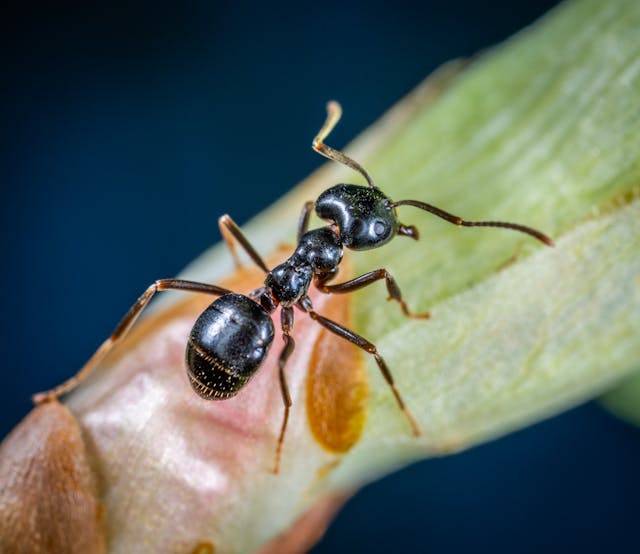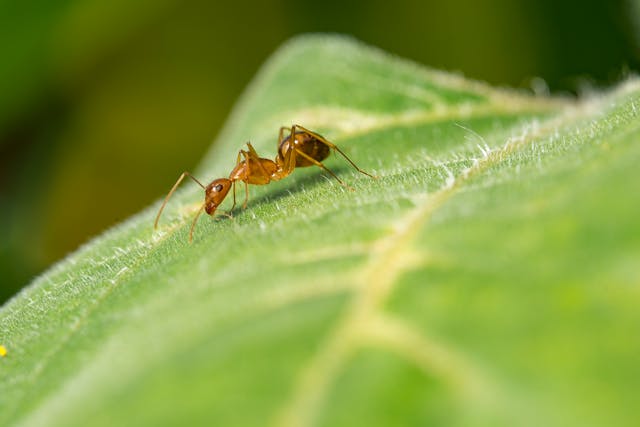
Are ants bad for tomato plants? This question might stir up curiosity among those stepping into the world of gardening for the first time. Ants, those tiny creatures we often encounter scurrying around, have a complex relationship with the plants in our gardens, particularly with tomatoes. But before we jump to conclusions, let’s embark on a journey to uncover the mysteries surrounding this intriguing topic.
In the vast realm of gardening, every plant has its companions and adversaries, and tomatoes are no exception. As we delve deeper, we will discover that ants play a role beyond what meets the eye. Their presence in the vicinity of tomato plants may raise eyebrows, but do they pose a threat, or could they be beneficial?
Picture a bustling garden scene where ants march tirelessly, seemingly oblivious to the lush green foliage of tomato plants. Are they mere spectators, or do they wield unseen influence? As we venture into the intricate web of nature’s interactions, we begin to discern patterns that challenge conventional wisdom.
Are Ants Bad For Tomato Plants ?
No, ants are not usually bad for tomato plants. They don’t eat tomato plants, but they may be attracted to the sweet nectar produced by extrafloral nectaries on tomato plants.
However, sometimes ants can protect harmful insects like aphids, which can harm tomato plants by feeding on their leaves. So, while ants themselves might not directly harm tomato plants, their presence could indirectly lead to problems if they’re protecting harmful bugs.
Ants in the Garden: Friends or Foes?

Ever spotted a trail of industrious ants marching their way through your garden? While these tiny creatures may seem like pests, they actually play a crucial role in the ecosystem.
Ants help aerate the soil by digging tunnels, which improves water and nutrient flow to tomato plant roots. Additionally, they prey on many common garden pests like caterpillars and aphids, acting as natural pest controllers.
On the flip side, ants can also be a nuisance in the garden. They have a sweet tooth and are attracted to the sugary excretions produced by aphids, often protecting these pests from predators.
Some ant species may also disturb the roots of tomato plants while building their nests underground, leading to stunted growth and decreased fruit production.
Balancing the benefits and drawbacks of ants in your garden is essential for maintaining a healthy tomato plant ecosystem.
Also Read– Why Should You Not Plant Cucumbers Near Tomatoes
Ants’ Role in the Ecosystem of Tomato Plants
Ants may seem like pesky critters when they invade your tomato plants, but they actually play a vital role in the ecosystem of your garden.
These industrious insects help break down organic matter, aerate the soil, and even provide some natural pest control by preying on smaller insects that might harm your precious tomatoes.
So, next time you spot a trail of ants marching through your garden, remember that they are nature’s little helpers, doing their part to keep the ecosystem in balance.
In addition to their direct contributions to soil health and pest control, ants also help disperse seeds by carrying them to new locations. This movement of seeds not only aids in plant reproduction but also fosters biodiversity in your garden.
So, while it may be tempting to reach for the insecticide at the first sight of an ant on your tomato plant, consider the bigger picture and appreciate the important role these tiny creatures play in maintaining a healthy and thriving garden ecosystem.
Must Check – What To Plant After Tomatoes Crop Rotation
Signs of Ant Infestation on Tomato Plants
If you start noticing a trail of tiny ants making their way up and down your tomato plants, it’s a pretty good sign that an ant infestation is underway.
These industrious insects are not in it for a leisurely stroll but are likely on a mission to farm aphids or other sap-sucking pests on your precious tomato foliage.
These pests excrete a sweet substance known as honeydew, which the ants find delicious and, in return, protect the pests from predators in a mutually beneficial relationship.
Another telltale sign of an ant infestation on your tomato plants is the presence of aphids, whiteflies, or mealybugs. These insects are often attended by ants, which act as their caretakers in exchange for the honeydew they produce.
If you spot these pests congregating on your tomato plants and notice ants scurrying around them, it’s a clear indication of an ant infestation that needs to be addressed promptly to prevent further damage to your plants.
Ants’ Impact on Tomato Plant Health

Ants may seem harmless crawlers, but they can have a sneaky impact on the health of your tomato plants. One of the main ways ants can affect tomato plant health is through their farming relationship with aphids.
Aphids are tiny insects that love to snack on tomato leaves, and ants actually “milk” aphids by stroking them to release a sugary substance called honeydew. This process can attract more aphids to the plants and lead to damage, weakening the overall health of the tomatoes.
In addition to their partnership with aphids, ants can also disrupt the natural balance of predator-prey interactions in the garden.
By protecting aphids from ladybugs and other beneficial insects that feed on them, ants indirectly contribute to higher aphid populations that can harm tomato plants.
So, while ants may seem innocuous at first glance, their presence can have a detrimental impact on the health and productivity of your beloved tomato plants.
How Ants can Benefit Tomato Plants
Ants might seem like just pesky little critters crawling around your garden, but believe it or not, they can actually benefit your tomato plants in some surprising ways. One of the main advantages of having ants around your tomatoes is their role in pollination.
While they may not be as efficient as bees, ants can help transfer pollen from one tomato flower to another as they scurry around the plant.
Additionally, ants can also act as a form of natural pest control for your tomato garden. Some species of ants are known to prey on common tomato pests like caterpillars and aphids, helping to keep their populations in check.
So, don’t be too quick to dismiss these tiny garden visitors – they might just be working silently to boost the health and yield of your tomato plants!
Recommended For effective organic pest control, give this product a try.
Common Misconceptions About Ants and Tomato Plants
Many gardeners believe that any presence of ants on tomato plants automatically signifies a problem. However, this is not always the case. While some species of ants can indeed cause harm to tomato plants by protecting pests like aphids, not all ants are detrimental.
In fact, certain types of ants, such as some species of carpenter ants, can actually help aerate the soil around tomato plants, aiding in their overall health.
Another misconception is that all ants carry diseases that can harm tomato plants. While it’s true that some ants can harbor harmful bacteria, the majority of ants found in gardens do not pose a threat to tomato plants or the garden ecosystem.
Understanding the specific species of ants present in your garden can help differentiate between those that are beneficial and those that may be causing harm.
It’s important to take a closer look at the interactions between ants and tomato plants before jumping to conclusions about their impact.
Natural Ways to Control Ants on Tomato Plants
If you’re dealing with ants on your tomato plants, there are natural ways to keep them in check. One effective method is to sprinkle cinnamon or cayenne pepper around the base of the plants.
Ants have an aversion to these spices and will be deterred from climbing up the stems.
Another natural solution is to create a barrier using diatomaceous earth. This powdery substance contains sharp particles that can pierce the exoskeleton of ants, causing them to dehydrate and perish.
Simply sprinkle a thin layer around the perimeter of your tomato plant garden to prevent ants from crossing over.
Recommended For effective organic pest control, give this product a try.
Chemical Solutions for Ant Infestations on Tomato Plants
Dealing with an ant infestation on your tomato plants can be a real pain in the neck, but fear not, there are some chemical solutions that can help you tackle the problem head-on.
One effective option is using insecticidal soap, which can be sprayed directly on the ants to eliminate them. Just make sure to follow the instructions on the label to ensure safe and effective application.
Another popular chemical solution is using ant bait stations. These stations contain a toxic substance that the ants take back to their colony, effectively wiping out the entire population.
Just be cautious when placing these stations, especially if you have pets or young children running around in the garden.
Preventative Measures to Keep Ants Away from Tomato Plants
When it comes to keeping ants away from your precious tomato plants, prevention is key. Start by making sure to keep your garden neat and tidy.
Remove any debris, fallen leaves, or overripe fruits that may attract ants. Additionally, seal up any cracks or openings in pots, containers, or the garden bed where ants may enter.
Another effective way to deter ants from infesting your tomato plants is by creating a barrier they won’t want to cross. Sprinkling cinnamon, coffee grounds, or citrus peels around the base of your tomato plants can act as a natural deterrent.
You can also try planting mint, basil, or garlic nearby, as these strong-smelling plants can help repel ants. Remember, by taking these simple preventative measures, you can keep your tomato plants healthy and free from ant invasions.
Recommended For effective organic pest control, give this product a try.
The Bottom Line: Are Ants Really Bad for Tomato Plants?
Ants crawling around your tomato plants may raise some concerns, but are they really as sinister as they seem?
While ants are often associated with pest problems in the garden, their presence doesn’t necessarily mean doom for your precious tomatoes. In fact, ants can sometimes be helpful allies in the battle against common garden pests.
These industrious insects have been known to feed on the eggs and larvae of certain tomato pests, such as aphids and caterpillars. By preying on these harmful bugs, ants can actually contribute to keeping your tomato plants healthy and thriving.
However, it’s essential to keep an eye on ant populations and ensure they don’t become too numerous, as their aphid-tending behavior can also lead to potential issues for your tomato plants.
Are ants harmful to tomato plants?
While ants themselves are not harmful to tomato plants, they can attract other pests that can damage the plants.
How can I tell if ants are infesting my tomato plants?
Look for lines of ants crawling on the plants or around the base of the plants. You may also see small mounds of soil near the plants, indicating ant activity.
Do ants help tomato plants in any way?
Yes, ants can help aerate the soil and control certain pests that may harm tomato plants.
What are some natural ways to get rid of ants on tomato plants?
You can try using diatomaceous earth, vinegar, or citrus peels to deter ants from your tomato plants.
Can chemical solutions be used to eliminate ant infestations on tomato plants?
Yes, there are chemical insecticides that can be used to get rid of ants on tomato plants, but it’s important to follow the instructions carefully to avoid harming the plants.
How can I prevent ants from infesting my tomato plants in the first place?
Keep your garden area clean and free of debris, trim back any overgrown vegetation, and seal off any entry points where ants can enter your garden.